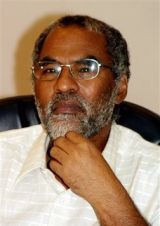Journalist’s killing marks rise in Sudan tensions
Sept 8, 2006 (KHARTOUM) — The beheading of a Sudanese journalist marks a rise in the power of extremists in Khartoum, analysts said on Friday, adding that it may have involved hardline officials breaking ranks with the government.

No one has claimed responsibility. Police say they have arrested some suspects and President Omar Hassan al-Bashir expressed condolences to the family of Taha.
The murder heightened political tensions in Khartoum, as the government headed down a collision course with the international community over its rejection of a U.N. Security Council resolution last week to deploy more than 20,000 troops and police to war-ravaged Darfur.
With international pressure intensifying Khartoum has cracked down on internal dissent, calling for national unity against what it calls the “external threat”.
Colleagues say Taha, whose criticism of other Islamists gave rise to a first assassination attempt in the 1990s, had begun to criticise the government’s policy on Darfur and recent price rises to fill a hole in the budget.
Some analysts said hardline government officials may be connected to the crime.
“The Sudanese government is not monolithic … it is likely that this is indicative of factionalism,” said Alex Vines, Africa analyst at Chatham House. “There may have been individuals in the government (involved).”
Hafiz Mohamed of the Justice Africa research institute agreed, saying: “Violence against political opponents with this government is not new.”
Taha’s murder, combined with a resurgence in censorship in the papers, has angered many journalists who have called for the resignation of Sudan’s defence and interior ministers.
CLOSING RANKS
President Bashir came to power in a military coup in 1989. With his spiritual mentor Islamist Hassan al-Turabi the government enforced a strict Islamic state until a power struggle and split with Turabi in December 1999.
Since then Islamic hardliners have played a lower-key role in politics and enforcement of Islamic sharia law has relaxed especially after a north-south peace deal in January 2005.
But in recent weeks some Islamist leaders in Khartoum said they were closing ranks with the government as they joined hands in rejecting U.N. forces in Darfur. Bashir has vowed to personally lead the resistance to U.N. troops.
Khartoum sees the U.N. presence as an invasion force that would lead to an Iraq-style quagmire and attract foreign fighters to battle Western troops.
Violence in Darfur has escalated and experts say the government has launched a new offensive against rebels who oppose a May peace deal.
Commentators say there is also a resurgence of political repression in Khartoum by the dominant National Congress Party. Peaceful protests in Khartoum have been violently broken up by police who beat and teargassed demonstrators.
“The National Congress and its security apparatus is doing what it likes regardless of the peace agreements and its partners in government,” said Sudanese opposition politician Mubarak al-Fadil.
(Reuters)
